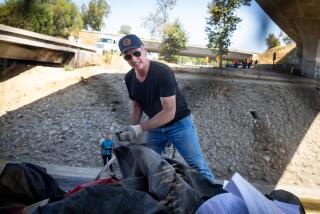Facing reelection, Newsom touts the ‘California way’ and teases gas tax rebate

Newsom said little about his vision for the final year of his first term. Instead he chose to emphasize climate change policies, COVID-19 response and the state’s prospering economy, a preview of the case he’ll make to voters in his campaign for a second term.
SACRAMENTO — Gov. Gavin Newsom cast the state as a beacon of democracy in a turbulent world in his annual address to lawmakers Tuesday, contrasting the “California way” through its embrace of diversity and inventive solutions with the politics of division and rising “authoritarian impulses” in America.
But as he embarks on a campaign for reelection, Newsom also promised a tax rebate for Californians as high gasoline prices weigh on the minds of voters and his Republican critics. Newsom blamed “geopolitical uncertainty,” referencing the war in Ukraine, for the increasing cost of gasoline.
“I think all of us at least here can agree that people have always looked to California for inspiration,” Newsom said. “Now, in the midst of so much turmoil with stacking stresses and dramatic social and economic change, California is doing what we’ve done for generations, lighting out [for] the territory ahead of the rest, expanding the horizon of what’s possible.”
It’s a Capitol tradition for the governor to deliver a State of the State speech outlining his agenda to lawmakers from both houses and political parties in the Assembly chamber. But for the second year in a row, Newsom bucked convention and chose a different location for the annual address, which some have suggested has become an irrelevant artifact from another era.
Speaking from a 21-story glass tower and state building blocks from the legislative chambers to an audience of more than 100, Newsom said little about his vision for the final year of his first term. Instead he chose to emphasize climate change policies, COVID-19 response and the state’s prospering economy, a preview of the case he’ll make to voters in his campaign for a second term leading up to the November election.
The approach felt similar to that of his State of the State speech last year, when Newsom spoke to a mostly empty Dodger Stadium and noted the toll of COVID-19 on California as he touted his administration’s response to the coronavirus. That address foreshadowed a pandemic argument his political team seized on to defeat the recall more than six months later.
“Our lockdowns, distressing as they were, saved lives,” Newsom said Tuesday. “Our mask mandates saved lives. Your choices saved lives. California experienced far lower COVID death rates than any other large state. Fewer than Texas, Ohio. Fewer than Florida — 35% fewer, to be exact.”
Though California’s sweeping COVID-19 restrictions caused an uproar in conservative areas and concern among many in the business community, the economic toll hasn’t been as severe as the impact felt in other big states.
California’s economy contracted less than those of other states during the pandemic and experienced the fastest-growing gross domestic product in the first three quarters of 2021, said Jerry Nickelsburg, director of the UCLA Anderson Forecast and a professor of economics.
“Our GDP growth has consistently outpaced not only the rest of the country, but most other large, Western democracies,” Newsom said.
Though Newsom said California stands out because it doesn’t leave workers behind as its businesses grow, fewer jobs are available now for low-wage workers in retail and hospitality than before the pandemic, Nickelsburg said.
“California lags in recovery of jobs lost compared to some other states, which gives California a higher unemployment rate, and that is because the jobs that were lost were in the sectors that have a preponderance of human contact necessary to deliver the services,” Nickelsburg said.
The decline in jobs is due in part to a drop in foreign tourists and shifts in the workplace as fewer California workers frequent restaurants during and after the workday.
“So, those two things mean that in leisure and hospitality and retail, California is a little slower to recover employment, and these are low-income sectors,” he said. “That is hurting the people who probably are least able to manage it.”
At the same time, Nickelsburg said, many workers are seeking alternative employment because risks for in-person retail and hospitality jobs have increased and wages have not.
Under Newsom’s leadership, California expanded support for workers and families during the pandemic through policies that provide rent relief, offer COVID-19-related paid sick leave and established a now-expired moratorium on evictions.
The governor’s January budget proposal also included a call to expand Medi-Cal to cover all income-eligible residents regardless of immigration status. He also proposed to pause the gas tax increase and built on that Tuesday when he said he would introduce a tax rebate for Californians to address rising gas prices.
The cost to transportation projects, however, could be high. A report last month by the nonpartisan Legislative Analyst’s Office concluded that a 1-cent drop in the state’s portion of the gas tax would reduce transportation revenues by as much as $175 million.
Assembly Republican leader James Gallagher of Yuba City criticized the lack of specifics around Newsom’s promise of a rebate.
“There’s a lot of programs that get announced by this governor, but not a lot of details,” he said.
Despite efforts to boost the safety net for California’s poorest residents, the issue of homelessness also remains top of mind to voters in cities who see the effects on their streets and sidewalks every day.
Before Newsom delivered his speech, Republican lawmakers released a video rebutting his expected address and calling the state’s homelessness crisis “an appalling failure of leadership.”
“The situation has only gotten worse,” Assemblywoman Suzette Martinez Valladares (R-Newhall) said in the video. “The failure of the governor on this issue is clear — not just in the growing encampments, but in the tidal wave of crime that’s washing over our communities.”
The GOP is seizing on concerns over homelessness and crime, issues that polls show remain key vulnerabilities for the Democratic governor with voters unsatisfied with his handling of both issues. Newsom raised expectations about his ability to reduce homelessness with his State of the State speech in 2020, when he declared that homelessness could be solved and called it “our calling.”
On Tuesday, Newsom noted his administration’s work to provide temporary and permanent shelter to 58,000 unhoused Californians since the pandemic began but added that “we all recognize we have more to do.”
Newsom introduced the broad outlines of a new plan last week that could force those suffering from untreated psychiatric disorders and drug addiction into “CARE Court,” a program in which counties must develop a plan to deliver housing and clinically prescribed treatment and medication to eligible candidates.
Newsom also continued his effort to refocus the political debate over crime on gun violence in his speech Tuesday.
“Our approach is to be neither indifferent to the realities of the present day nor revert to the heavy-handed policies that have marked the failures of the past,” Newsom said. “We’re funding local law enforcement and prosecutors to investigate and solve more crime. We’re bolstering the attorney general’s office, prosecuting organized theft rings, and getting illegal guns off our streets.”
The crux of Newsom’s case for “the California way” centered on climate change, the work on which he said “California has no peers.”
Newsom has made good on his campaign promises to be a national leader on environmental issues and climate change, calling for all new cars sold in the state to have zero carbon emissions by 2035. He also took a step toward requiring health and safety buffer zones around oil and gas wells.
But some environmentalists wanted to hear more from the Democratic governor on climate issues.
R.L. Miller, former chair of the California Democratic Party Environmental Caucus, said advocates for rooftop solar have been waiting for Newsom to take a position on a proposal by the California Public Utilities Commission to rewrite the state’s rooftop solar incentive program, which would increase costs for homeowners.
“He missed this opportunity to say anything about rooftop solar,” Miller said. “And the longer he puts this off, the more angry we are.”
Assembly Speaker Anthony Rendon (D-Lakewood) said Newsom’s agenda appears to align with many of the ideas legislators will focus on in the coming months.
“I think he definitely hit all the issues that people are concerned about and that we need to tackle this year,” he said.
Times staff writer John Myers contributed to this report.
More to Read
Sign up for Essential California
The most important California stories and recommendations in your inbox every morning.
You may occasionally receive promotional content from the Los Angeles Times.












